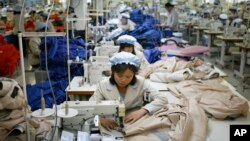The government in Seoul says North Korea is set to charge South Korean firms a controversial late fee for not paying workers at the Kaesong Industrial Complex a disputed wage increase.
Under a rule imposed unilaterally by North Korea, South Korean factories operating at the complex can be charged an additional 0.5 percent of the daily wage in late payment fees. The rule has been in place since 2010, but it is getting renewed attention amid heightened tension over wage increases for North Korean workers at the complex.
The two sides have been at odds over the wage issue. In February, Pyongyang notified Seoul of its decision to raise the monthly minimum wage from $70.35 to $74.00 starting in March. Seoul immediately rejected the demand, saying North Korea had agreed not to make unilateral decisions on wage increases.
March wages, paid by the companies directly to the North Korean government, are due April 20, and Seoul has asked its companies to pay the current rate. But South Korea says Pyongyang is demanding the new wage rate and is likely to consider the difference as a late payment.
North Korea has not commented on the matter.
South Korean businessmen who own factories at the complex express concern that the late payment fee will escalate the tension between Seoul and Pyongyang.
Seoul on Wednesday made it clear that it will not accept the late fee rule.
“It is not appropriate for North Korea to impose the late fee rule at this moment,” said Lim Byeong-cheol, spokesman for Seoul's Unification Ministry. Lim said Seoul’s current position is that the wage should be paid based on the existing agreement between the two sides.
Seoul plans to initiate fresh talks with Pyongyang to resolve the issue in the near future. Earlier, the two sides met in an attempt to settle the wage dispute, but failed to narrow differences.
More than 53,000 North Korean workers are employed at about 120 South Korean factories in the park, which is located just north of the demilitarized zone dividing the two Koreas.




